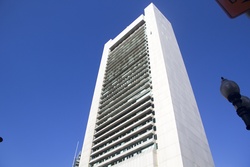Stop Harvard land grabs coalition demands reparations for former Harvard farmland purchases in Brazil
By Alex Chou and Ayumi Nagatomi

The Stop Harvard Land Grabs Coalition reiterated calls for the University to provide reparations to residents impacted by former holdings in Brazilian farmlands at an annual hybrid panel Wednesday.
The Stop Harvard Land Grabs Coalition, which partners with 17 Harvard and global organizations, seeks to end the school’s natural resources investments and demand regenerative solutions to damages inflicted from such holdings. The organization has long criticized Harvard for its former ownership of Brazilian farmland, which activists say were environmentally and socially harmful to the region.
The annual event, which started in 2015, aims to raise awareness of farmland holdings in many university endowment and pension funds.
According to Devlin Kuyek, a researcher at GRAIN — a farming activist group focusing on the Global South — Harvard began buying large swaths of farmland after the 2007-08 financial crisis.
“This was part of a larger trend — a larger wave of land grabbing that emerged at that time — where companies were scouring the planet, looking for places to acquire large areas of farmland and to produce agricultural commodities for export,” Kuyek said.
Research from GRAIN showed that in the period between 2008 and 2016, Harvard conducted nearly 500 land deals across 78 countries. In 2016, 10 per cent of Harvard’s endowment was allocated toward natural resources investments, which encompass farmland and timberland holdings.
Harvard Management Company, the entity that stewards the University’s endowment has since spun out its natural resources investments — including all farmland holdings — to Solum Partners, an investment management firm, and decreased the endowment’s natural resources allocation to one per cent.
HMC remains invested in Solum Partners — meaning that any of Solum’s land holdings are indirectly part of Harvard’s endowment — but retains little involvement in its day-to-day operations.
Maria Luisa Mendonça, the director of the Network for Social Justice and Human Rights, said that Harvard is one of the “key players that are promoting this process of financial speculation and control over farmland around the world.” Mendonça also cited the U.S.-based pension fund Teachers Insurance and Annuity Association of America-College Retirement Equities Fund.
“Even if it’s one per cent of the portfolio, it's still huge for the communities on the ground,” Mendonça said during the event.
Stop Harvard Land Grabs organizer Rachel E. Carle, a Harvard Kennedy School graduate, said Harvard affiliates “have a responsibility to speak out when Harvard is causing harm with our money in our name.”
“The Harvard endowment is being used, for the most part, to destroy livelihoods, rural communities, and to expand a very destructive type of agriculture,” Mendonça said in an interview prior to the event.
HMC spokesperson Patrick S. McKiernan declined to comment, citing company policy.
Mendonça said Harvard has a responsibility to ensure that its investments are ethical.
“To look at the mission of educational institutions such as Harvard — with such a high profile — we should set a standard to protect lands, not to engage in deforestation and destruction of lands and human rights violations against indigenous communities,” Mendonça said.
Moving forward, Mendonça said she hopes for continuous “movement building,” allowing students to take on active roles in pressuring the administration to be “more transparent, to be open, to engage in dialogue, and to take concrete measures to stop the destruction of land.”
Staff writer Alex Chou can be reached at [email protected].
Staff writer Ayumi Nagatomi can be reached at [email protected]. Follow her on X @ayumi_nagatomi.













